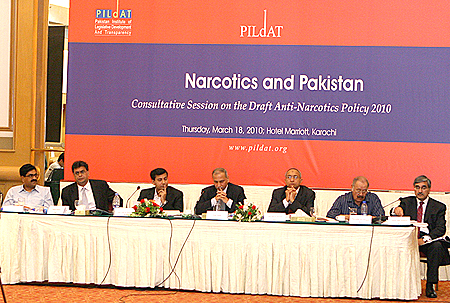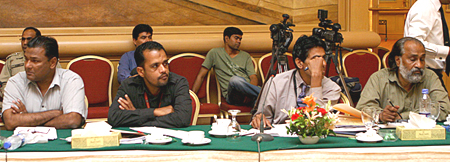|
|
| |
| EVENTS |
|
|
> PILDAT Consultative Session on Draft Anti Narcotics Policy 2010: Karachi
Strict Punishments for Drug-traffickers and effective role of Law Enforcement Agencies stressed in Anti-Narcotics Policy 2010: Syed Faisal Subzwari, Minister of Youth Affairs |
|
|
| |
Karachi, March 18; Syed Faisal Ali Subzwari, MPA, Minister of Youth Affairs, Government of Sindh, praised law enforcement agencies� role in apprehending drug-traffickers but said that these efforts needed to be strengthened. At the local level, however, he said that drug trafficking and use is only made possible through the covert support of police and influentials of the area which needs to be looked into. He praised the integrity of the top officials of narcotic control agencies but said that the integrity needed to be institutionalised. �If any one from MQM is found involved at any level in this heinous crime or its support, I offer myself to be held responsible in this case,� he claimed confidently. Media campaign and public involvement was needed for any sound policy and its effective implementation, he said, supporting the draft policy�s focus on social mobilisation. �We not only support the cause of narcotics and drug control, but we will take this forward as our own agenda, he pledged on behalf of his party and the Sindh Government. In any future programme relating to youth, we will include an anti-drug and anti-narcotic message, he said. He offered his support for setting up rehabilitation centres and facilities in Karachi and in wider Sindh. |
|
| |
Mr. Subzwari was concluding the second PILDAT Consultative Sessions on the review of the draft National Anti-Narcotics Policy 2010 held at Karachi. Participating MPAs, representatives of drug control and rehabilitations organisations, medical experts and academics believed that the policy needed to introduce stricter punishments for drug traffickers to tackle the menace of drugs and narcotics in Pakistan.
|
|
| |
Mr. Tariq Khosa, Federal Secretary, Ministry of Narcotics Control, said that the Prime Minister of Pakistan, through the creation of an Inter-Agency Task Force (IATF) on Narcotics Control in February 2010, displayed his and his Government�s commitment and seriousness to the anti-narcotics drive in Pakistan. He said that the anti-narcotics drive could only work if there was a social movement behind it. He referred to the movement for the restoration of Judges as a model which proved that if there was sufficient public support, any goal could be achieved. Mr. Khosa said that the draft Anti-Narcotics Policy was shared for a wider input and review through the courtesy of PILDAT so that a comprehensive plan can be put in place. He said that more than the severity of punishment, it is the certainty of the punishment that may act as a deterrent in |
|
| |
Maj. Gen. Syed Shakeel Hussain, Director General Anti Narcotics Force, said that the draft Anti-Narcotics Policy 2010 was prepared keeping in view Pakistan�s challenges as a trafficking route in the region as well as internal problems. Instability in Afghanistan in the post 9/11 environment has resulted in increased production of opium and heroin, which provides 90% of world consumption. In addition, no reduction in demand of drugs in destined countries, increase in trafficking and use of psychotropic substances, resurgence of poppy cultivation in Pakistan and diluted effort of Law Enforcement Agencies (LEAs) against drugs due to their engagement in counter terrorism operations, etc. have been taken into account as challenges. He said that though the narcotic drugs interdiction results of Pakistan are quite encouraging and are also appreciated by the international community yet the spill over effects of situation in Afghanistan adversely affect the drugs scenario in Pakistan. Presenting highlights of the draft Policy, he said that the policy aimed reduction in drug supply, prevention of Drug Demand and promotion of International Cooperation in Fight against Drugs. |
|
| |
Mr. Nadeem Rehman, HIV Adviser, United Nations Office on Drugs and Crime (UNODC), Pakistan said that while the consultation in Islamabad was very useful with Parliamentarians, the wider participation of practitioners in Karachi meant that there was a greater awareness of issues involved. even though Pakistan is not a major producer or consumer of drugs, its location made it attractive as a drug-trafficking route. He said that the UNODC through its other regional offices is striving for a balanced approach between supply and demand. He said that the UNODC advocates social mobilisation against the menace of drugs and crime. |
|
| |
Mr. Muzaffar Ali Changezi, Chairman, Mailo Shaheed Trust, Quetta, who believed that law enforcement agencies did not do justice to their job of narcotics control, advocated for stricter punishments for drug-traffickers and users to achieve the drug-free status of Pakistan. He said that the policy must incorporate practical steps needed to eliminate drugs from society. |
|
| |
Dr. Muhammad Zakria Kandhro, President, Al-Nijat Welfare Society, Karachi, recommended the introduction of death penalty for drug-traffickers and said that until media adopted an anti-drug attitude and stopped promotion of the use of drugs, no social movement could be possible against drugs. He highlighted the weaknesses in the role of law-enforcement agencies in this regard. |
|
| |
Earlier,Mr. Ahmed Bilal Mehboob, Executive Director PILDAT, said that Narcotics Control remains a key issue in the country, especially its linkages with financing of terrorism and insurgency. There is little or no attention focussed on this crucial issue and therefore PILDAT consultative session sought to invite stakeholders� views and review of the draft Policy. He appreciated the openness and support of the Ministry of Narcotics Control in providing relevant information and facilitation of a dialogue. |
|
| |
The third of the PILDAT Series of Consultative Sessions on Draft Anti-Narcotics Policy 2010 will be held in Lahore on March 19, 2010. |
|
| |
|
|
| |

|
|
| |
|
|
| |

|
|
| |
|
|
| |

|
|
| |
|
|
| |

|
|
| |
|
|
| |

|
|
| |
|
|
| |

|
|
|
|
|
|
|
|
|